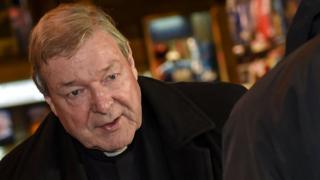Home » Australasia »
Who is George Pell?
Cardinal George Pell’s child sexual abuse conviction has rocked the Catholic Church, where for years he has been one of its highest-ranked officials.
It has had the same effect in Australia, Pell’s home nation, where his career began decades ago.
The cleric made his name as a determined figure who championed traditional Catholic values and conservative views against same-sex marriage, abortion and contraception.
But his career has been dogged first by claims that he covered up child sexual abuse by priests, and then later that he himself was an abuser. He has always denied any wrongdoing, but has been jailed for six year years after being found guilty of abusing two boys in 1996.
Pell was born in the city of Ballarat, near Melbourne, Victoria, in 1941, the son of an Anglican father and an Irish Roman Catholic mother.
His early education was at Loreto Convent and later at St Patrick’s College where he excelled in sports, particularly Australian Rules football.
Such was his prowess on the football field that towards the end of his studies he signed a contract with Richmond Football Club, but then switched his attention to the priesthood.
He later said he had tried to fight his calling for a long time.
Pell began his training for the priesthood in 1960 at Corpus Christi College, the regional seminary for Victoria and Tasmania, and in 1963 went to Rome to continue his studies.
He was ordained at St Peter’s Basilica in Rome in 1966 and went on to take a doctorate in Church history in Oxford.
He returned to Australia in 1971, taking a post as an assistant priest in Swan Hill, Victoria, and then at parishes in and around Ballarat.
By 1996, he had risen to be archbishop of Melbourne, where he was responsible for initiating one of the Church’s first programmes directly responding to claims of child sexual abuse.
The plan, called the Melbourne Response, offered modest pay-outs to victims, and was criticised by some who said it was designed to discourage cases in the courts. But supporters called it a pro-active measure to tackle abuse.
He was later appointed archbishop of Sydney, before Pope John Paul II nominated him to the Vatican’s College of Cardinals in 2003, a position that allowed him to vote in papal elections.
In 2014, Cardinal Pell was summoned to Rome to become chief of the Vatican’s finances, a new position created by Pope Francis in the wake of scandals at the Vatican Bank.
But he left behind growing anger over revelations of child sex abuse by members of the Catholic clergy in Australia.
Cardinal Pell repeatedly faced allegations from abuse victims of a cover-up and his critics accused him of appearing aloof and arrogant.
He was accused of moving one notorious paedophile priest – Gerald Ridsdale – around parishes rather than reporting him, and of attempting to bribe one of the victims to keep quiet.
He strongly denied any wrongdoing but said he could have done more to investigate claims of abuse.
Pell has also denied subsequent allegations that he himself committed abuse in Ballarat in the 1970s. Prosecutors have withdrawn charges charges against him relating to that era.
But he was convicted for abusing two choir boys in a Melbourne cathedral in 1996, during his time as the archbishop of the city.
In a video of Pell’s first police interview in relation to the 1996 allegations, which was recorded in 2016 but released this year, Pell describes the accusations at the time as “a load of absolute disgraceful rubbish… madness”.
He was placed on a leave of absence from the Vatican in June 2017.
Pell was demoted from Pope Francis’ inner circle in December.
He was sentenced to six years in prison by a Victorian court in March, but immediately lodged an appeal.
Source: Read Full Article



